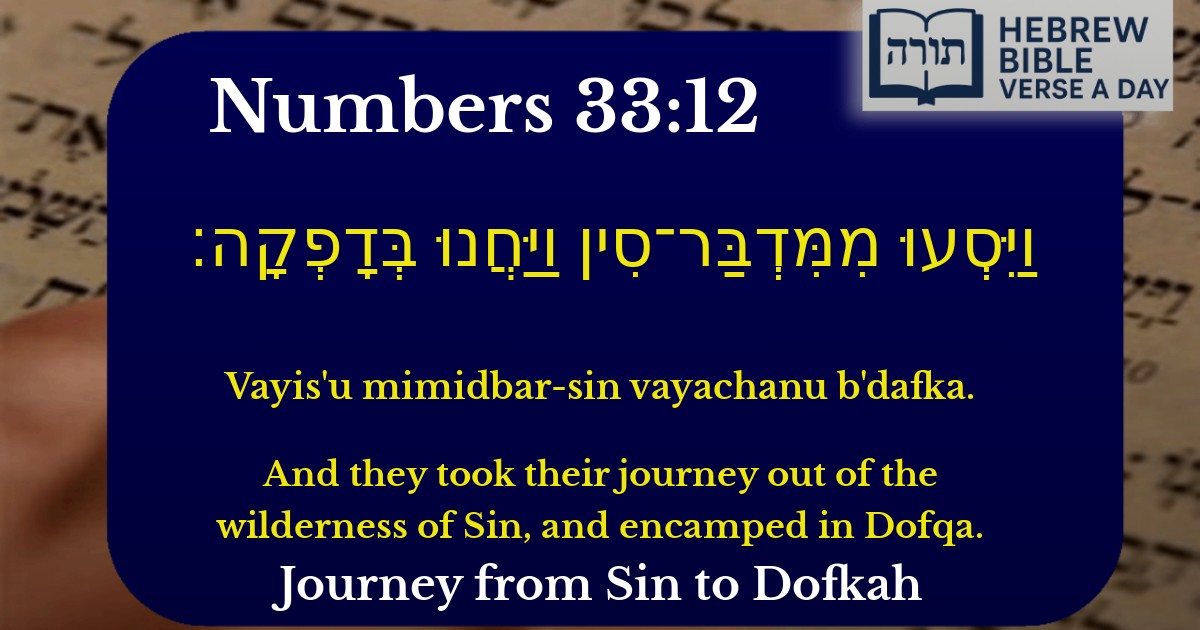Frequently Asked Questions
Q: What does the verse 'And they took their journey out of the wilderness of Sin, and encamped in Dofqa' mean?
A: This verse describes one of the many stops the Israelites made during their 40-year journey through the wilderness after leaving Egypt. According to Rashi, each encampment is recorded to show G-d's kindness in guiding them through harsh conditions. The 'wilderness of Sin' was a difficult place, and 'Dofqa' was their next stop along the way.
Q: Why is it important to list all the places where the Israelites camped?
A: The Torah lists all 42 encampments (Numbers 33) to teach us that every step of the journey was meaningful. The Midrash (Bamidbar Rabbah) explains that just as G-d guided the Israelites through each station, He also guides us through every stage of life. Each stop had lessons and challenges that helped shape the nation.
Q: What can we learn from the Israelites' journey from the wilderness of Sin to Dofqa?
A: We learn that growth happens step by step. The Rambam (Maimonides) teaches that spiritual progress, like the Israelites' journey, requires patience and perseverance. Moving from one place to another symbolizes continuous growth and trusting in G-d's plan, even when the path is unclear.
Q: How does this verse apply to our lives today?
A: Just as the Israelites moved from place to place under Divine guidance, we too experience transitions in life. The Talmud (Berachot 64a) says, 'Torah scholars have no rest, not in this world nor in the World to Come,' meaning we must always strive forward. This verse reminds us to see every 'stop' in life as part of a greater journey.
Q: What is the significance of the name 'Dofqa'?
A: Rashi notes that some place names in the Torah hint at events that occurred there. 'Dofqa' comes from the Hebrew root meaning 'to knock,' suggesting that the Israelites may have faced challenges ('knocks') at this location. The Midrash Tanchuma teaches that each encampment tested their faith in different ways.


Location and Meaning of Dofqa
The verse describes Bnei Yisrael's journey from the wilderness of Sin to Dofqa (דפקה). Rashi (Bamidbar 33:12) explains that the names of these encampments hint at the events that occurred there. The name Dofqa (from the root דפק, meaning "to knock") alludes to Hashem "knocking" on the hearts of Bnei Yisrael to awaken them to repentance, as they struggled with faith during their travels.
Spiritual Significance of the Journey
The Midrash Tanchuma (Masei 3) teaches that each encampment represented a stage in Bnei Yisrael's spiritual refinement. Leaving the wilderness of Sin (סין)—associated with the sin of the Golden Calf—and arriving at Dofqa symbolized a transition from rebellion to a call for introspection. The Rambam (Hilchot Teshuvah 3:4) emphasizes that divine providence guides individuals through challenges to inspire teshuvah, much like the "knocking" at Dofqa.
Lessons from the Encampments